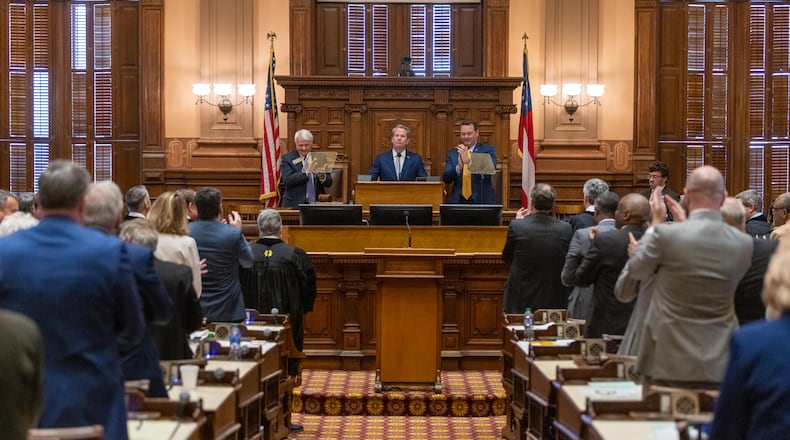Tucked into a newly released measure by top House Republicans to roll back hospital regulations is a tacit acknowledgement that a push to expand Georgia’s Medicaid program likely won’t happen this year.
The bill introduced Tuesday by House Speaker Jon Burns and his deputies includes a provision that would set up a study committee to examine the Arkansas Medicaid waiver to add more people to the public health rolls in Georgia.
In legislative parlance, it’s a way of delaying what was already viewed as a long-shot proposal to expand Medicaid until after the November election. Absent a last-minute compromise, officials say they will focus on reviving the debate in 2025.
In a statement, Burns said he and other House Republican leaders remain “100% supportive” of a more limited expansion backed by Gov. Brian Kemp. But he made clear he was open to discussing a broader expansion in 2025.
The retreat came as little surprise, since no proposal to expand Medicaid has emerged more than halfway into the legislative session. Kemp and other key Republicans who vigorously fought expansion for the past decade never embraced the idea.
Still, it represents a setback for advocates from both parties who hoped to find common ground this year to pass legislation that would expand coverage to hundreds of thousands of Georgians.
“It’s unfortunate, because Georgians will suffer because of this,” said House Minority Leader James Beverly, the chamber’s top Democrat. “Republicans are entrenched in this foolishness of saying no. And we have to win the governorship if we want to see real health care expansion in Georgia.”
Top Republicans have opposed expanding Medicaid since then-President Barack Obama muscled it through Congress more than a decade ago as part of the Affordable Care Act. They say the program is too costly and inflexible in the long term.
But for the first time since the Georgia Legislature voted in 2014 to give itself authority to expand Medicaid’s rolls, senior Republican leaders entered this year’s session indicating they were open to a serious discussion about expanding the program.
Credit: arvin.temkar@ajc.com
Credit: arvin.temkar@ajc.com
The shift was partly because Kemp’s plan to extend Medicaid coverage to Georgians who meet work or activity requirements — known as the Pathways program — has drawn muted interest, with fewer than 3,000 uninsured applicants enrolled in it through Dec. 15 out of an estimated 370,000 who could apply.
Pathways operates under a federal waiver granted in the final days of the Trump administration that’s set to expire in 2025. Some Republicans say it’s unlikely to get an extension if President Joe Biden is reelected, since he and other Democrats have pressed states to adopt a broader expansion.
“Knowing that waiver may expire in 2025,” Burns said, “we also want to take the time to gather the facts, hear from policy experts and stakeholders, and craft the best policy possible to support our low-income, uninsured population across the state, which will help patients and providers alike.”
With the 2024 election looming — and wide-open races for governor and other top offices in 2026 — some Republicans hoped to neuter Democratic criticism of Georgia’s health policy by joining the 40 other states that have already expanded Medicaid.
But Lt. Gov. Burt Jones, a likely candidate for governor in 2026, recently said he’s only “heard rumors” of a pending bill, but he demanded that it be tied to a regulatory change to make it easier to construct new hospitals.
And Kemp’s aides recently sent word to lawmakers he was skeptical of an expansion.
The study committee gives Republican lawmakers seeking another term in November a way to tell their constituents they’re still seeking ways to provide more access to health care. For years, polls have shown most Georgians support Medicaid expansion, putting GOP opponents in a political squeeze.
Democrats say another delay means hundreds of thousands of Georgians will remain without Medicaid coverage at a time when many other Republican-led states have abandoned their opposition to a full-fledged expansion.
“After nearly 15 years, maybe one more year will do the trick,” said state Sen. Josh McLaurin, D-Sandy Springs.
Credit: HYOSUB SHIN / AJC
Credit: HYOSUB SHIN / AJC
The study committee would be expected to scrutinize a program adopted in Republican-led Arkansas, where 250,000 additional residents are eligible for Medicaid coverage under a policy that health care analysts have dubbed the “private option.”
Under the Arkansas plan — which also operates under a federal waiver — the state used expansion dollars to buy private insurance for uninsured residents. The idea has already drawn interest from some Republican officials who see it as an easier sell to conservative voters.
About the Author
Keep Reading
The Latest
Featured






